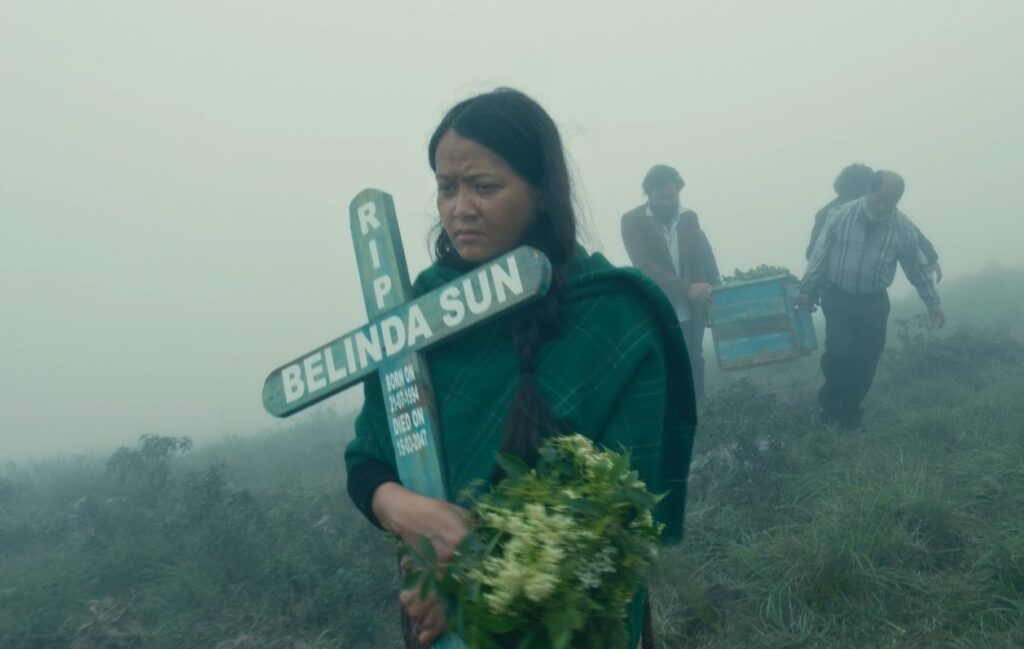With Ha Lyngkha Bneng (The Elysian Field, Khasi, 2025), Khasi filmmaker Pradip Kurbah presents a film of quiet, unwavering grace, whose soulful and carefully crafted simplicity carries a depth of feeling that is both sincere and deeply moving. There is no attempt at grand gestures—only a calm, clear-eyed honesty. Within the fading rhythms of a dying village, the film uncovers the delicate, enduring notes of a fragile but persistent symphony.
Set in the Khasi Hills in 2047, Ha Lyngkha Bneng looks at Complete (Richard Kharpuri), Livingstone (Albert Mawrie), Maia (Baia Marbaniang), Friday (Jeetesh Sharma), Miss Helen (Helena Duiia), Promise (Merlvin Mukhim), and Grace (Sumi Kshiar) – villagers bound not by blood, but by a fragile yet enduring fidelity to the land they refuse to abandon. What unites them is not drama or destiny, but a steady, almost imperceptible commitment to the rhythms of a vanishing world. What follows is a story not of dramatic transformations, but of endurance – the zeal of staying alive, caring, and acknowledging those around us.
In the film’s first twenty minutes, we witness the villagers’ silent mourning for Livingstone, who has lost his wife, Belinda (Lapynhun Sun). No words are spoken during these early scenes, yet an urgent, almost visceral sense of loss permeates the frame. Belinda now exists only in memory, and the village, nearly abandoned, bears the scars of slow erosion, drained by the relentless pull of distant cities. The narrative unfurls as a lyrical meditation on memory and resilience. There is no central conflict in the traditional sense; there are no antagonists, no manufactured urgency. Neither is there a tragic hero in the conventional sense, but instead individuals who embody the quiet endurance of human presence.
As the story begins, only six villagers remain, all of them suspended in the slow unravelling of a way of life. Midway through, another character dies. Yet this is not a tale of despair, but one of enduring solidarity. It is not a lament for what has been lost, but a meditation on what remains. The villagers, each carrying small dreams and private griefs, form a collective of resistance, not against progress, but against erasure. In their act of stubborn staying, they affirm the dignity of presence.
At one point, two men find themselves in love with the same woman. Her answer is disarmingly direct when asked whom she will choose: “Myself.” The moment is understated but definitive, and it establishes a tone of self-possession and quiet subversion that runs through the film. Men and women share space without hierarchy, drink and smoke together without censure. There is no judgmental gaze here, only a calm, egalitarian intimacy. Even the failing power supply during key moments serves as a subtle metaphor, symbolising the fragility of presence, the unreliable flow of memory, and the precariousness of our connections. It also subtly functions as a political statement, alluding to systemic failure, with an MLA mentioned for the collapse in service.
Kurbah and his co-writer, Paulami Dutta, offer a faithful portrayal of lived experience by setting the film in an isolated village. The language – both visual and narrative – is spare, yet rich with emotional depth, capturing the last, lingering echoes of a community on the brink of vanishing. A mysterious six-member choir subtly weaves through the narrative, adding a surreal layer, as if it’s an echo from another world. The film begins and ends with an old-style bus. More than just a mode of transport, it becomes a symbol of memory, bearing witness to what has passed and what, somehow, remains. These symbolic elements create a vision of humanity not as a spectacle, but as the quiet persistence of everyday survival.
Shot with painterly restraint, Pradip Daimary’s cinematography finds its visual language in the stillness of its setting. He favours long takes that allow conversations to unfold in real time, while the vastness of the exteriors is absorbed in mood, texture, and atmosphere. Badeimon Kharshiing’s editing mirrors this quietude, establishing a gentle rhythm as the characters navigate grief, memory, and a collective resolve to endure. However, the narrative feels stretched, undoing a lot of its strength. A tighter runtime could have preserved the film’s meditative quality while sharpening its emotional arc. The sound design, by Sumir Dewri, Saptak Sarkar, and Sayantan Ghosh, complements the visual subtlety with an aural palette that is equally restrained and evocative. Ambient sounds – the soft murmur of conversations, the atmospheric weight of silence, and the intermittent crackle of electricity – root us in a world that feels both timeless and on the verge of vanishing.
Performance-wise, it is the entire ensemble that quietly commands attention. No single actor is elevated above the others; instead, each performance complements the rest with understated precision. Their chemistry feels organic, as if these characters had known one another long before the cameras began rolling.
Ha Lyngkha Bneng may well be Pradip Kurbah’s most formally intricate work to date, where an evolution in narrative structure and tonal control can be observed. Within its soulful and calibrated simplicity, the film resonates with a quiet emotional power that is restrained and richly textured.
Ha Lyngkha Bneng not only had its world premiere in the Main Competition section of the just concluded Moscow International Film Festival, but also won the Best Film, Best Director & a NETPAC award at the Festival.
Khasi, Drama, Color


